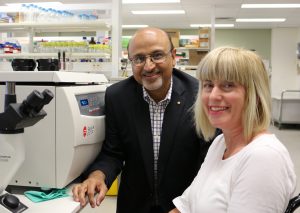
QIMR’s Professor Rhajiv Khanna & trial participant Louise Remmerswaal
Autologous Epstein Barr virus-specific adoptive T cell therapy continues to show promise as a novel treatment for patients with progressive MS.
In a phase 1 clinical trial in Queensland, EBV-specific T cells were successfully generated from peripheral blood mononuclear cells in 11 of 13 patients with either primary or secondary progressive disease.
The two MS patients who were unable to produce EBV-specific T cells and a third MS patient with an unrelated cancer diagnosis were withdrawn from the study.
The ten remaining patients each received four escalating doses of T cells at fortnightly intervals and were monitored for 26 weeks from the first infusions.
Neurologist Professor Michael Pender, from the University of Queensland, said seven of the ten patients showed clinical improvement.
“Improvements ranged from reduced fatigue and improved productivity and quality of life to improvements in vision and mobility.”
“Without this treatment, we would have expected their symptoms to continue to get worse.”
“Importantly, we found the treatment was safe and without serious side effects,” he said.
The study published in the Journal of Clinical Investigation found more patients receiving T cells with strong EBV reactivity had clinical and quality of life improvements than patients receiving T cells with weak EBV reactivity.
“Although this was an uncontrolled study, our finding of a substantial relationship between clinical response and EBV reactivity and polyfunctionality of the T cell product, of which both the patients and examining neurologists were unaware, suggests that the clinical benefit might be due to the T cell therapy,” the study said.
“We postulate that clinical improvement results from the killing of EBV-infected B cells in the CNS by the adoptively transferred CD8+ T cells, thereby preventing further autoimmune attack on the CNS and allowing neurological recovery through mechanisms, such as remyelination, dendritic and axonal sprouting, and synaptic remodelling.”
“Our data add to the mounting evidence for a pathogenic role of EBV infection in MS.”
Coauthor Professor Rhajiv Khanna, from QIMR Berghofer Centre for Immunotherapy and Vaccine Development, said it was the first time a T cell immunotherapy had been used to treat an autoimmune disease.
“We have already used these cellular immunotherapy to treat different types of cancer and viral infection. This trial opens the door to develop similar cellular immunotherapy for certain other autoimmune conditions.”